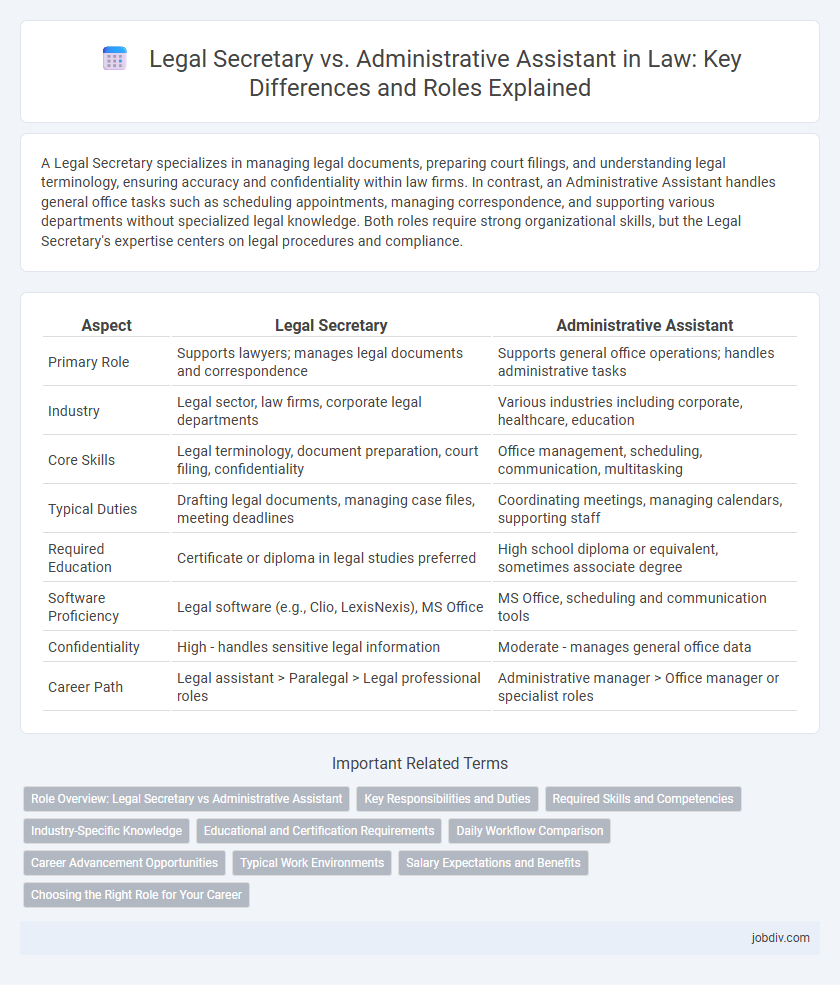A Legal Secretary specializes in managing legal documents, preparing court filings, and understanding legal terminology, ensuring accuracy and confidentiality within law firms. In contrast, an Administrative Assistant handles general office tasks such as scheduling appointments, managing correspondence, and supporting various departments without specialized legal knowledge. Both roles require strong organizational skills, but the Legal Secretary's expertise centers on legal procedures and compliance.
Table of Comparison
| Aspect | Legal Secretary | Administrative Assistant |
|---|---|---|
| Primary Role | Supports lawyers; manages legal documents and correspondence | Supports general office operations; handles administrative tasks |
| Industry | Legal sector, law firms, corporate legal departments | Various industries including corporate, healthcare, education |
| Core Skills | Legal terminology, document preparation, court filing, confidentiality | Office management, scheduling, communication, multitasking |
| Typical Duties | Drafting legal documents, managing case files, meeting deadlines | Coordinating meetings, managing calendars, supporting staff |
| Required Education | Certificate or diploma in legal studies preferred | High school diploma or equivalent, sometimes associate degree |
| Software Proficiency | Legal software (e.g., Clio, LexisNexis), MS Office | MS Office, scheduling and communication tools |
| Confidentiality | High - handles sensitive legal information | Moderate - manages general office data |
| Career Path | Legal assistant > Paralegal > Legal professional roles | Administrative manager > Office manager or specialist roles |
Role Overview: Legal Secretary vs Administrative Assistant
Legal Secretaries specialize in supporting attorneys by managing case files, drafting legal documents, and coordinating court schedules, requiring knowledge of legal terminology and procedures. Administrative Assistants handle broader office tasks such as scheduling meetings, managing correspondence, and maintaining general office operations without specialized legal expertise. The distinction lies in the Legal Secretary's focus on legal support functions versus the Administrative Assistant's role in general administrative duties across various industries.
Key Responsibilities and Duties
Legal Secretaries specialize in preparing legal documents, managing case files, and coordinating communications between attorneys, clients, and courts to ensure compliance with legal procedures. Administrative Assistants handle a broader range of office tasks such as scheduling appointments, managing correspondence, and maintaining office supplies, supporting general administrative functions across various departments. Legal Secretaries require specialized knowledge of legal terminology and court protocols, while Administrative Assistants focus on organizational and clerical skills applicable to multiple industries.
Required Skills and Competencies
Legal Secretaries require specialized skills in legal terminology, document preparation, and case management software proficiency, along with strong attention to detail and confidentiality. Administrative Assistants need competencies in office administration, scheduling, and communication, with adaptability to various industries. Both roles demand excellent organizational skills, multitasking ability, and proficiency in standard office software.
Industry-Specific Knowledge
Legal secretaries possess specialized expertise in legal terminology, court procedures, and document preparation essential for law firms, whereas administrative assistants typically manage general office duties across various industries. Proficiency in legal software such as Case Management Systems and e-filing platforms distinguishes legal secretaries from administrative assistants, who utilize standard office software like Microsoft Office. Understanding of regulatory compliance and confidentiality protocols is critical for legal secretaries, reflecting their focused role within the legal sector.
Educational and Certification Requirements
Legal secretaries typically require specialized training in legal terminology, procedures, and document preparation, often obtained through certificate programs or associate degrees in legal studies. Administrative assistants may have more general education backgrounds, such as high school diplomas or associate degrees, with optional certifications like the Certified Administrative Professional (CAP) to enhance their skills. Legal secretary certification from organizations like the National Association of Legal Secretaries (NALS) distinguishes professionals with verified expertise in legal office practices.
Daily Workflow Comparison
Legal secretaries manage specialized tasks such as drafting legal documents, organizing case files, and coordinating with attorneys to prepare for trials, which requires familiarity with legal terminology and procedures. Administrative assistants handle broader responsibilities including scheduling meetings, managing correspondence, and maintaining office operations across various departments without specialized legal knowledge. The legal secretary's workflow emphasizes precision in legal compliance and document management, while administrative assistants focus on overall office efficiency and general administrative support.
Career Advancement Opportunities
Legal secretaries often experience faster career advancement by gaining specialized knowledge in legal procedures, court documentation, and case management, which opens pathways to paralegal roles or legal office management. Administrative assistants typically have broader responsibilities across industries, so career growth depends on developing organizational skills and gaining expertise in a specific business sector, sometimes leading to office manager or executive assistant positions. Legal secretarial roles provide targeted experience that can enhance professional credibility and increase opportunities within the legal field compared to more generalized administrative assistant roles.
Typical Work Environments
Legal secretaries typically work in law firms, corporate legal departments, or government agencies where they manage legal documents, correspondence, and scheduling court appearances. Administrative assistants are commonly found across various industries such as healthcare, education, and finance, supporting office operations with general clerical tasks and communication. Both roles require strong organizational skills, but legal secretaries operate in specialized environments with a focus on legal terminology and procedures.
Salary Expectations and Benefits
Legal secretaries typically earn higher salaries than administrative assistants, with average annual wages ranging from $45,000 to $65,000, reflecting their specialized legal knowledge and responsibilities. Benefits for legal secretaries often include health insurance, retirement plans, and paid legal training, enhancing their overall compensation package. Administrative assistants usually receive standard benefits and lower salary ranges, averaging $35,000 to $50,000 annually, due to broader, less specialized duties.
Choosing the Right Role for Your Career
Legal secretaries possess specialized knowledge of legal terminology, court procedures, and document preparation, making them indispensable in law firms and legal departments. Administrative assistants handle broader office management tasks including scheduling, communication, and general clerical support across various industries. Choosing the right role depends on your interest in law-specific responsibilities versus versatile administrative duties, influencing career growth and skill specialization.
Legal Secretary vs Administrative Assistant Infographic

 jobdiv.com
jobdiv.com